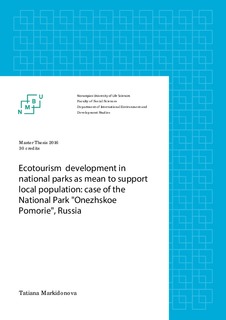| dc.description.abstract | The National Park “Onezhkoe Pomorie” is situated in the remote and inaccessible area of Russian North (Arkhangelsk region), where limited development opportunities for local population. Lack of jobs and degradation of traditional lifestyle force people migrate to urban areas. Therefore, the development of ecotourism in the recently established National Park and involvement of local population can improve the socio-economic situation. This research investigates perspectives of ecotourism development, and its possible contribution to sustainable livelihoods of local communities through the following objectives.
First, the research was aimed to examine present livelihoods situation. Second, it explored stakeholders’ perceptions toward the National Park and its conservation policies. Third, it studied perceptions towards ecotourism development in the Park and involvement of local people in it. To accomplish these tasks qualitative research method was adopted. Data was collected through semi-structured interviews with five main actor groups: local people, park managers, touroperators, local authorities and NGOs.
The study revealed that local livelihoods largely depend on natural resource use, especially on fishing, and collecting of timber and firewood. However, local residents perceive that conservation has decreased the availability of these products because different restrictions were imposed, and has made them even more vulnerable. Therefore, the Park, which seems to pursue top-down management, perceived by majority as a threat. Further, despite park managers and NGOs stressed importance of local people’s participation in the management of park, there is no policy in place. Community in the study area do not have any roles and rights in the park management, or power to control over the natural resources.
The study also found that the territory of the Park has a great potential for ecotourism development due to unique nature, objects of cultural and historical heritage, and traditions of local people. Despite the attractiveness, such factors as remoteness, inaccessibility and lack of infrastructure prevent the intended development of the tourism. While park managers believe that tourism would be a useful tool for community development, they lack knowledge and experience to develop the area into a tourism destination. Moreover, local people do not participate in the decision-making and planning processes of ecotourism development. The study also revealed that as a legacy of Soviet time local community lacks of initiative and entrepreneurial skills. Therefore, the current situation is unfortunate when local people suffer and tourism opportunities are not developed as they could be. | nb_NO |

